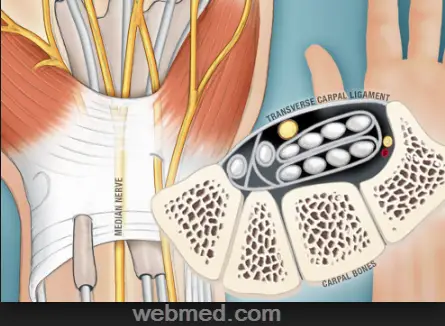5 Causes & Symptoms of Carpal Tunnel Syndrome
Is carpal tunnel syndrome (CTS) a modern-day condition? Needles and pins in the fingers and hand have been around since man became a man! But at the mention of having a feeling of numbness or tingling in the area of the hand, it will be assumed that you are suffering from carpal tunnel syndrome.
Most people have no understanding of what carpal tunnel syndrome is, so it is better than we gain some knowledge about the physical features which bring about the syndrome.
The bones of the wrist are known as the carpals which exist on three sides of the wrist. On the fourth side is the transverse carpal ligament, the whole structure is referred to as the carpal tunnel through which the median nerve passes. There are nine flexor tendons lodged in the carpal tunnel also, which control bending of the wrist.
The wrist is the slimmest part of the human body, so the nerve and tendons fit into a somewhat confined space. If the unnatural pressure is applied to this area than the median nerve can become compressed and fail to function correctly, carpal tunnel syndrome is the result.
The median nerve provides the feelings to the thumb, index, middle, and part of the ring finger. When the nerve becomes compressed the sensations to these fingers are lost and your hand will feel like it is ‘going to sleep’
If the sensory nerve passing through the tarsal tunnel becomes damaged in any way, then similar sensations of tingling and numbness are felt in the foot and toes. This is known as Tarsal Tunnel syndrome. It is far less common than carpal tunnel syndrome.
Causes of Carpal Tunnel Syndrome
The absolute cause of carpal tunnel syndrome is not known, but if any condition causes abnormal pressure on the median nerve in the wrist the syndrome will show. Some common conditions which are associated with CTS are:
- Arthritis
Any change in the condition of the carpal tunnel can cause irritation and compression of the median nerve, which then results in numbness and tingling sensations in the thumb, index, and middle finger causing them to ‘go to sleep’. This condition is referred to as Carpal Tunnel Syndrome.(CTS).
- Obesity and pregnancy
There are sometimes other reasons as to why the tendons in the carpal tunnel become swollen. These are associated with hormonal imbalances, as in people with thyroid problems, or ladies whose hormone balance has been upset by pregnancy. Such underlying causes require attention, but very often the use of anti-inflammatory medicine will help with the CTS condition.
- Repetitive strain injuries
When the wrist is bent for any reason, the already small carpal tunnel becomes narrower. Keeping the wrist bent, or repeatedly bending the wrist places pressure on the median nerve. Such wrist bending is part of our daily lives, but the repetitive action of wrist bending as in guitar playing, typing, or mouse movement by a computer operator compresses the nerve and causes the symptoms of CTS.
It is also possible that this kind of repetitive action can cause injury to the tendons within the carpal tunnel. If the tendons swell, then within the confined space of the tunnel, the pressure will be exerted on the median nerve, causing it to become compressed.
- Diabetes.
- Some rare diseases such as multiple myeloma, sarcoidosis, and leukemia may also contribute to the syndrome.
Signs and Symptoms of Carpal Tunnel Syndrome
The most common symptoms of CST are as follows, but will often provoke the remark that “my hand and fingers have gone to sleep”
- Numbness and tingling sensations in the hand. These feelings will be felt throughout the path of the median nerve and will affect the thumb, index, and middle fingers.
- These feelings may worsen at night time causing sleep disturbance. There are two possible reasons for this a). The flexed wrist position whilst asleep, and b) fluids collecting around the wrist and hand, when the wrist is in a flattened position.
- Cramping and weakness in the hand accompanied by burning sensations as the syndrome progresses.
Loss of grip may be experienced leading to the continual dropping of any objects being handled. In some cases, chronic carpal tunnel syndrome can cause atrophy of the hand muscles, which will affect the muscles at the base of the hand and in the palm.
If anti-inflammatory medicine is given, then generally the swelling of the tendons in the carpal tunnel will reduce, thus relieving the pressure on the median nerve, and the symptoms of CTS will disappear. The danger is of course repeatedly returning to the repetitive action, which inevitably may induce the symptoms of CTS to become permanent.
Early treatment of CTS is necessary to avoid its progression, so at the first signs of symptoms, medical advice should be sought out for a correct diagnosis.
5 Carpal Tunnel Syndrome Causes and Symptoms, Last Updated: 22/7/2017



Pingback: What are the Warning Signs of Carpal Tunnel Syndrome - Body Pain Tips